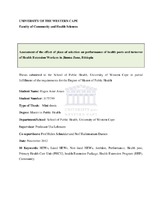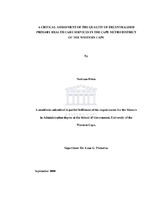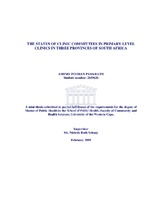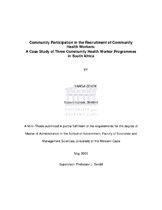| dc.contributor.advisor | Lehmann, Uta | |
| dc.contributor.advisor | Schneider, Helen | |
| dc.contributor.advisor | Damen, Hailemariam | |
| dc.contributor.author | Aman, Hagos Amir | |
| dc.date.accessioned | 2015-02-09T09:19:45Z | |
| dc.date.available | 2015-02-09T09:19:45Z | |
| dc.date.issued | 2012 | |
| dc.identifier.uri | http://hdl.handle.net/11394/3947 | |
| dc.description | Magister Public Health - MPH | en_US |
| dc.description.abstract | The Health Extension Program (HEP) was initiated under the Health Sector Development Program (HSDP II) in 2002/03. The central philosophy of these initiatives was based on the belief that if the right knowledge and skill is transferred, each household can take responsibility for producing and maintaining its own health. The HEP is delivered through Health Extension Workers (HEWs), who are local women and have completed grade 10. Recruitment of these
workers is conducted by kebele (village) and woreda (district) councils. Following this they are provided with a one year training prior to being employed by the district health office. The HEP guideline states that all HEWs should be assigned to a health post within their own community.The rationale for this requirement is that health policy makers and mangers believe that the deployment of non-local HEWs results in poor performance and turnover. However, there is no evidence to support this assumption. This study was conducted to better understand the effect of place of selection on the performance of health posts and turnover of Health Extension Workers in Jimma Zone, Ethiopia.A cross sectional analytical study design was utilized to assess the effect of place of selection on the performance of health posts and turnover of HEWs in a randomly selected sample of six districts of Jimma Zone. A systematic record review on the activity reports for the Ethiopian Fiscal Year (EFY) 2003 was conducted on all selected health posts in Jimma Zone(239 randomly selected health posts from all functional rural and urban health posts in Jimma Zone) obtained from the district health office. Descriptive statistics was computed to describe the socio demographic characteristics and the level of performance. Chi-square test was performed to test the relationship amongst the variables.The finding from this study showed that HEWs who are assigned outside of their communities performed as well or even better than those recruited from the same communities.The differences between the relationship of staff turnover and retention couldn‟t be estimated due to limited availability of information related to this factor. Overall, despite the widely held opinion among policy makers that recruiting HEWs from the same community enhances their performance; there is little empirical evidence to support this argument based on the findings from this study. Thus, it is essential to explore additional factors and criteria in the selection and recruitment process beyond residence-based measures in the expectation to enhance the performance of the HEWs. | en_US |
| dc.language.iso | en | en_US |
| dc.subject | HEWs | en_US |
| dc.subject | Local HEWs | en_US |
| dc.subject | Non local HEWs | en_US |
| dc.subject | Attrition | en_US |
| dc.subject | Performance | en_US |
| dc.subject | Health post | en_US |
| dc.subject | Primary Health Care Unit (PHCU) | en_US |
| dc.subject | Health extension package | en_US |
| dc.subject | Health Extension Program (HEP) | en_US |
| dc.subject | Community | en_US |
| dc.title | Assessment of the effect of place of selection on performance of health posts and turnover of health extension workers in Jimma Zone, Ethiopia | en_US |
| dc.type | Thesis | en_US |




